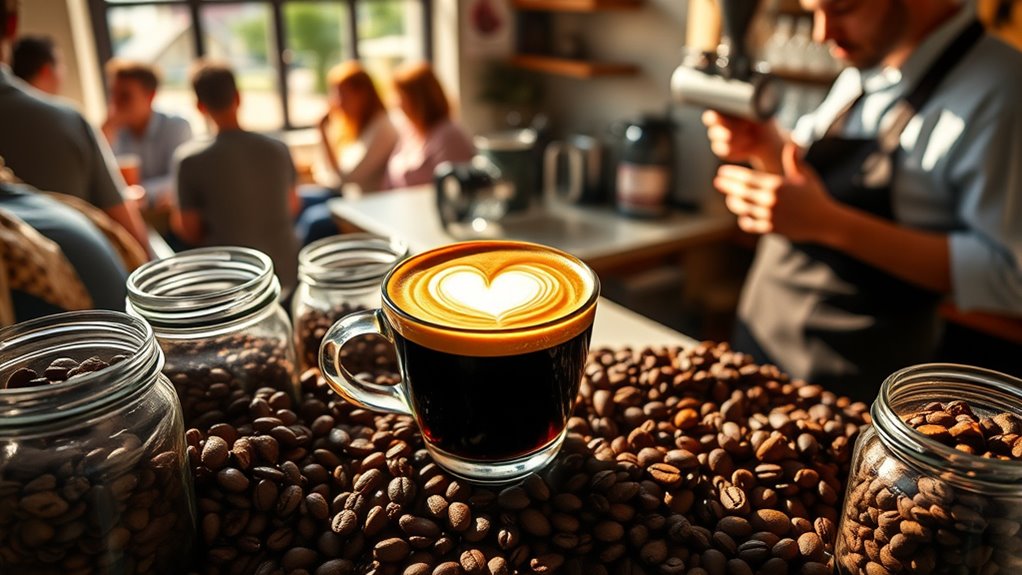The rise of specialty coffee culture has shifted your focus from simple convenience to unique flavors and ethical sourcing. It all began with Erna Knutsen’s vision in the 1970s, promoting high-quality beans over mass-produced options. As you explore this evolution, you’ll discover how coffee shops became social hubs and how traceability and sustainability reshaped your daily brew. This journey into specialty coffee opens up a world of community connection and exciting brewing innovations waiting to be explored.
Key Takeaways
- Specialty coffee emerged in the 1970s, prioritizing high-quality beans and unique flavor profiles over mass-produced, low-quality options.
- The Second Wave transformed coffee into a craft product, emphasizing quality and social spaces, paving the way for the specialty coffee movement.
- The Third Wave focuses on traceability, sustainability, and ethical sourcing, enhancing consumer awareness and promoting environmentally friendly practices.
- Innovative brewing methods like cold brew and nitro brew have gained popularity, catering to consumer preferences for diverse and refreshing coffee experiences.
- Community engagement through workshops and festivals fosters appreciation for specialty coffee while supporting local economies and sustainable practices.
The Origin of Specialty Coffee
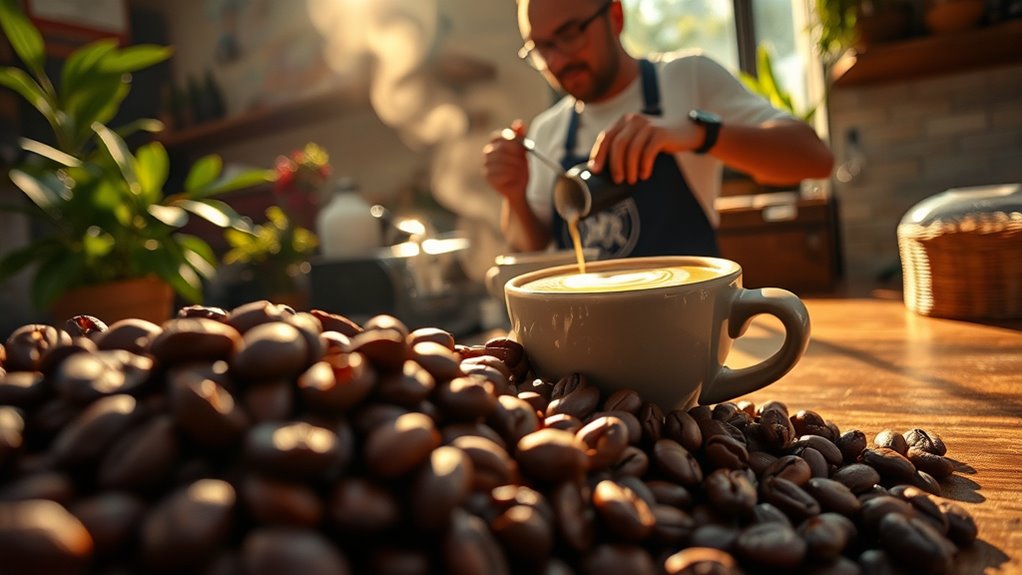
Specialty coffee has its roots in a pivotal moment in the 1970s when Erna Knutsen coined the term during an interview.
She recognized a shift in the coffee industry, where consumers began to appreciate quality based on flavor profiles rather than merely country of origin. By selling small quantities of high-quality coffee to regional roasters, Knutsen set the stage for a new approach.
This focus on flavor distinctions, rather than bulk trading, influenced other companies like Royal Coffee to embrace craftsmanship. The rise of specialty coffee marked a significant departure from the First Wave, dominated by brands like Maxwell House and Folgers.
It heralded a refined coffee culture, emphasizing quality and the unique characteristics of each bean.
What Was Coffee Like Before Specialty?
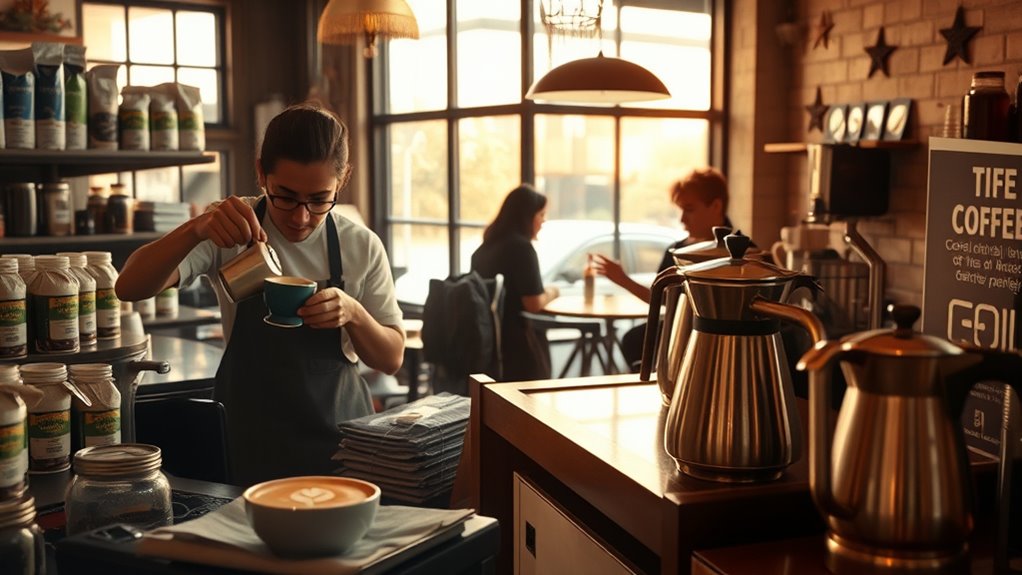
Before the rise of specialty coffee, the landscape of coffee consumption was vastly different. You’d find yourself drinking pre-ground options from brands like Maxwell House and Folgers, focusing on convenience rather than quality.
Coffee was often viewed as a commodity, with little regard for flavor profiles or the origins of the beans. Most people assessed coffee quality based on bean shape and size, distinguishing between “Mocha” and “Java” types.
Coffee was once seen merely as a commodity, with little appreciation for its diverse flavors and origins.
The First Wave emphasized bulk trading and carton packaging, laying the groundwork for taste distinctions but still offering low-quality beans.
It wasn’t until the 1970s that the concept of specialty coffee emerged, highlighting high-quality beans scoring 80 or above, which transformed how you experience and appreciate coffee today.
The Second Wave of Coffee
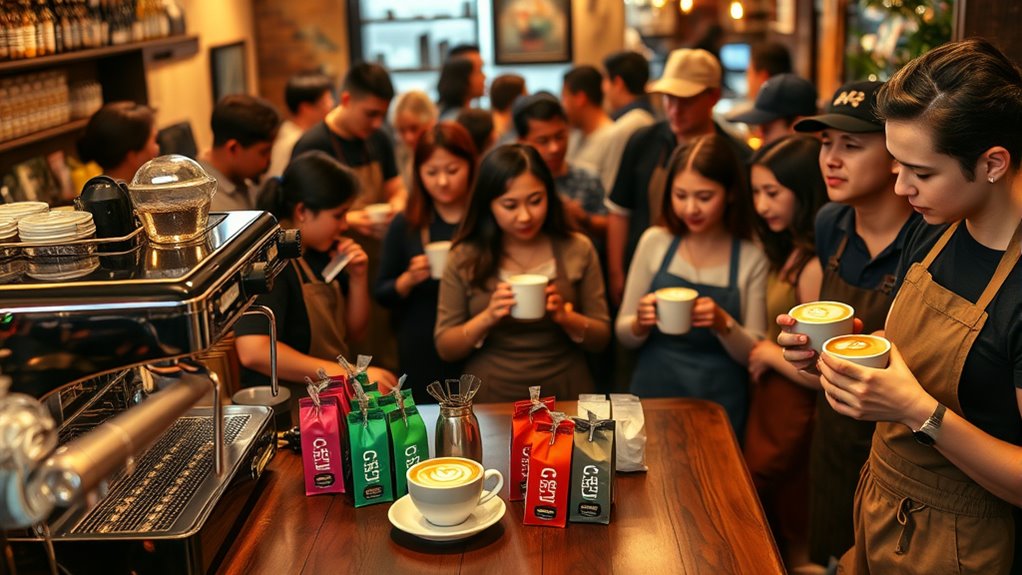
As the coffee landscape evolved, the Second Wave emerged in the 1960s, driven by Alfred Peet’s vision to elevate coffee beyond mere convenience. This era shifted consumer expectations, focusing on quality coffee and dark roasts.
Here are three key aspects of the Second Wave:
- Emphasis on Craft: Coffee became a craft product rather than a simple beverage, with a greater appreciation for roasting and bean origin.
- Coffee Shops Boom: The proliferation of coffee shops across the U.S. transformed how you enjoyed coffee, creating social spaces centered around quality.
- Influence on Specialty Coffee: The Second Wave set the stage for specialty coffee, paving the way for future trends in traceability and unique processing methods. Additionally, the emphasis on quality craftsmanship in coffee production parallels the principles found in sustainable practices, ensuring a lasting impact on consumer choices.
This wave truly redefined your coffee experience.
The Third Wave of Coffee
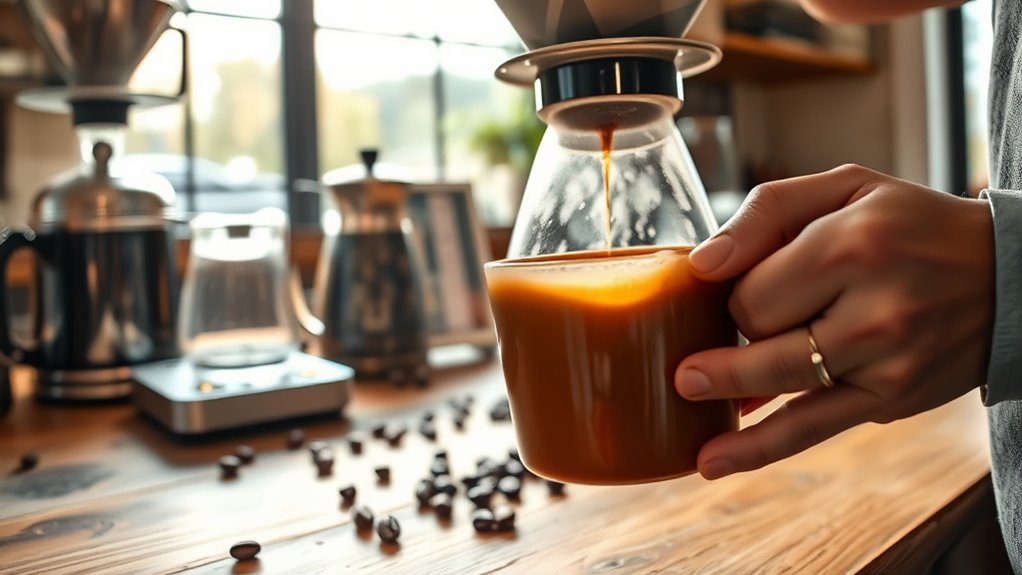
In the Third Wave of coffee, you’ll discover a strong focus on traceability and sustainability, which sets it apart from previous movements.
You’ll notice unique processing methods that highlight the beans’ natural flavors, making each cup a true reflection of its origin.
This shift not only enhances your coffee experience but also fosters a deeper connection to the craft behind your brew.
Traceability and Sustainability
While many coffee drinkers savor their daily brew, the movement known as the Third Wave of coffee goes beyond just taste; it prioritizes traceability and sustainability. This approach guarantees that you know the origins of your coffee and the farmers behind it, emphasizing quality and ethical sourcing.
Here are three key aspects:
- Traceability: You can trace your coffee back to its source, fostering transparency in the supply chain.
- Sustainability: The Third Wave promotes environmentally friendly practices, such as organic farming and fair trade certifications.
- Community Benefits: Local cafes and roasters support living wages for farmers, enhancing local economies and contributing to sustainable coffee production.
Unique Processing Methods
Exploring the unique processing methods of coffee can transform your brewing experience, revealing a spectrum of flavors that reflect the intricacies of each technique. In the specialty coffee scene, Third Wave coffee culture emphasizes traceability and innovative fermentation styles. These methods enhance flavor profiles, especially in light roasts, allowing you to enjoy the beans’ inherent characteristics.
| Processing Method | Flavor Characteristics |
|---|---|
| Natural | Fruity, sweet, full-bodied |
| Washed | Clean, bright, vibrant |
| Honey | Balanced, sweet, complex |
| Anaerobic Fermentation | Unique, intense, diverse |
| Carbonic Maceration | Fruity, floral, layered |
With these brewing methods, you can appreciate the depth and variety that unique processing brings to your cup.
Global Influences on Specialty Coffee Culture
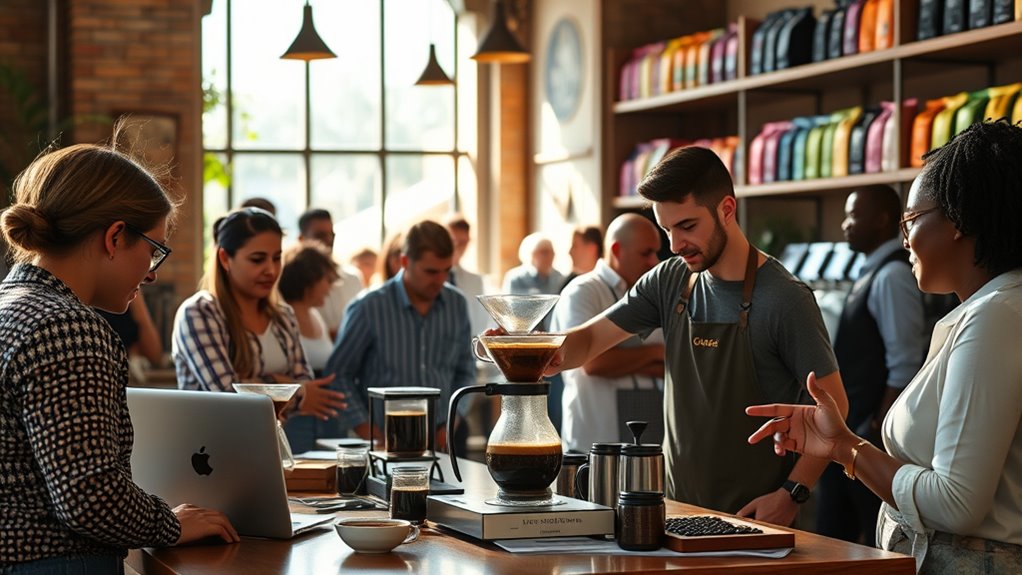
As specialty coffee continues to evolve, its cultural landscape reflects a rich tapestry of global influences that shape consumer preferences and industry standards.
You’ll notice how these elements come together:
- Sustainable Sourcing: Nordic countries lead the charge in promoting eco-friendly practices, influencing your local specialty coffee markets.
- Innovative Brewing Methods: Australia and New Zealand have introduced techniques like the flat white, elevating your coffee experience.
- Consumer-Producer Relationships: Emerging connections in regions like Mexico and Indonesia enhance local economies, allowing coffee professionals to create better value for you.
- Ambience Considerations: The rise of specialty coffee shops often includes cozy textiles, creating inviting spaces that enhance your overall enjoyment of the beverage.
Together, these global influences enrich specialty coffee culture, enhancing not just the quality of your beverage but also the stories behind each cup.
Emerging Trends in Specialty Coffee
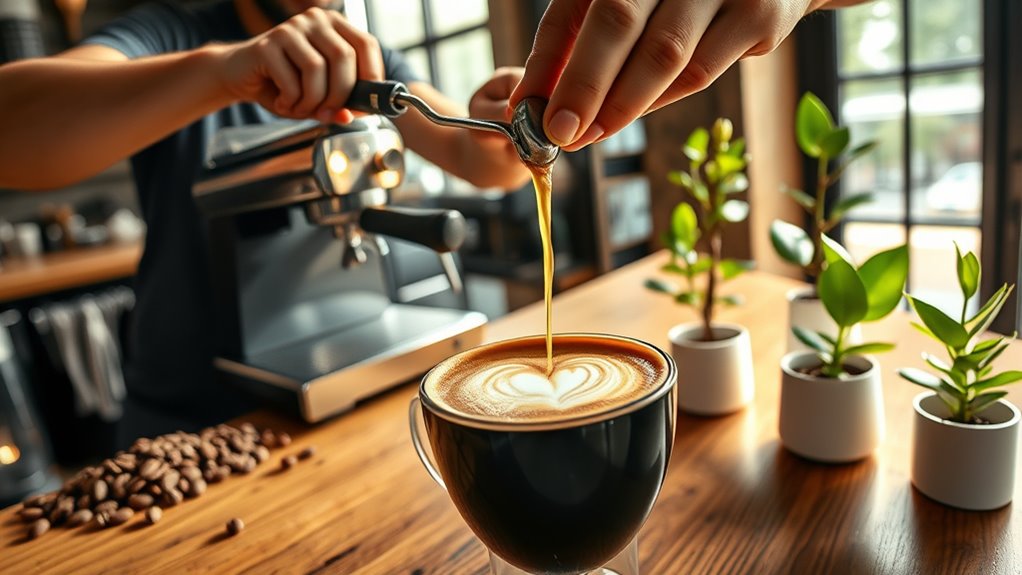
The evolution of specialty coffee culture is marked by exciting emerging trends that reflect changing consumer tastes and priorities. You’ll find specialty coffee shops embracing the Third Wave of coffee culture, where traceability and sustainability take center stage.
Micro-roasters are pushing boundaries with unconventional fermentation styles, creating unique flavor profiles that captivate your palate. Cold brew and nitro brew have surged in popularity, offering invigorating options perfect for warmer days.
At-home brewing has gained traction, especially post-Covid, leading you to invest in quality tools that enhance your brewing experience. Additionally, many shops are adopting sustainable practices, such as eco-friendly sourcing and packaging, ensuring that your coffee choices align with a more responsible lifestyle.
Embrace these trends to elevate your coffee journey!
The Future of Specialty Coffee
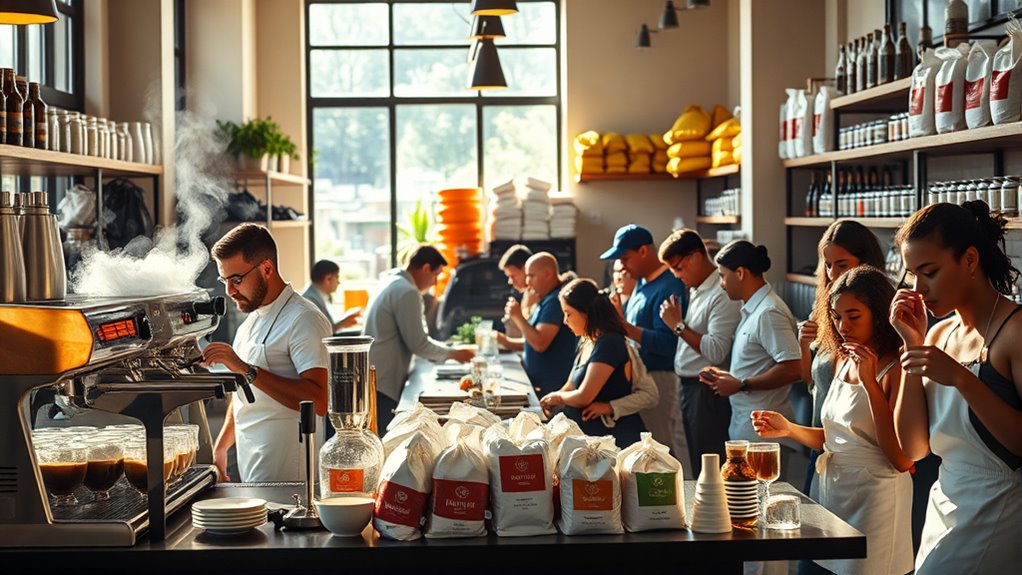
As you explore the future of specialty coffee, you’ll notice innovative brewing techniques reshaping your coffee experience.
Sustainability will play an essential role, with practices that prioritize the environment and guarantee ethical sourcing.
Plus, local community engagement initiatives are set to enhance your appreciation for the craft and connection behind each cup.
Innovative Brewing Techniques
How do innovative brewing techniques transform your coffee experience? They open up a world of flavor experiences, allowing you to explore unique textures and aromas.
With precision brewing equipment, you can control temperature and brew time, enhancing the taste of single-origin coffees. Here are three exciting methods to try:
- Cold Brew: This method offers a smooth, less acidic flavor, perfect for warm days.
- Nitro Brew: Infusing coffee with nitrogen creates a creamy texture and foamy head, elevating your drinking experience.
- Barrel Aging: This experimental technique infuses coffee with rich, complex flavors, taking your palate on a journey.
As sustainability gains importance, many innovative brewing methods incorporate eco-friendly practices, ensuring you enjoy your coffee responsibly.
Sustainable Coffee Practices
With consumer demand for transparency and sustainability on the rise, specialty coffee practices are evolving to meet these expectations.
Coffee producers are now implementing sustainable practices that not only enhance coffee quality but also support community development, particularly in traditional growing regions like Mexico and Indonesia. By focusing on living wages, farmers improve their lives while adopting environmentally friendly methods.
Local cafes play an essential role, acting as hubs for education on fine coffee and sustainable practices.
Moreover, innovative fermentation styles and unique processing methods explored by micro-roasters create distinct flavors while prioritizing eco-responsibility.
As you enjoy your next cup, you’re not just savoring a beverage; you’re supporting a movement toward a more sustainable future in the coffee industry.
Community Engagement Initiatives
While the specialty coffee industry continues to evolve, community engagement initiatives are becoming essential for fostering connections between consumers and producers.
Local cafes are at the forefront, offering educational workshops that enhance your understanding of specialty coffee and sourcing practices. These initiatives not only build knowledge but also create a sense of community.
Consider these ways to engage:
- Attend Coffee Festivals – Events like the Prague and Warsaw Coffee Festivals connect you with local producers and international roasters.
- Support Micro-Roasters – Collaborate on innovative products that reflect your local coffee culture.
- Participate in Fair Trade Practices – Guarantee coffee producers receive fair wages, strengthening local economies and sustainability.
These efforts cultivate a deeper appreciation for the coffee you love.
Frequently Asked Questions
What Is the Growth Trend in Specialty Coffee?
The growth trend in specialty coffee is quite remarkable.
You’ll notice an increasing number of specialty coffee shops popping up, especially in regions like Southeast Asia and Eastern Europe. Consumers are seeking higher quality and unique flavors, which drives demand.
Younger generations, particularly Gen Z, are influencing this shift, often experimenting with at-home brewing.
This trend indicates a broader appreciation for premium coffee experiences, suggesting that specialty coffee isn’t just a fad; it’s here to stay.
What Is the History of Specialty Coffee?
The history of specialty coffee starts in the 1970s when Erna Knutsen introduced the term, shifting the focus to flavor profiles rather than just bean types.
In the 1960s, Alfred Peet influenced the second wave by emphasizing dark roasts and bean origins.
As coffee culture evolved, the third wave emerged, prioritizing traceability and sustainability.
Today, specialty coffee is defined by the Specialty Coffee Association as beans scoring 80 or above, showcasing quality and craftsmanship.
How Has Coffee Culture Changed Over Time?
Coffee culture’s changed dramatically over time.
You’ve witnessed a shift from simple coffee shops to lively social spaces where quality matters. In the past, coffee was just a drink; now, it’s an experience.
You enjoy exploring diverse flavors and origins, reflecting a deeper appreciation for the craft.
With a focus on sustainability and unique brewing methods, today’s coffee culture invites you to connect with your beverage in a way that was once unimaginable.
What Is so Special About Specialty Coffee?
When it comes to coffee, you can’t judge a book by its cover.
Specialty coffee stands out due to its high-quality beans, meticulously sourced and processed to enhance their unique flavors. You’ll experience a rich tapestry of tastes that reflect the bean’s origin, unlike standard brews.
Plus, the emphasis on sustainable practices not only makes each cup better for the planet, but it also elevates your coffee experience to something truly exceptional.
Conclusion
As you sip your meticulously brewed cup of specialty coffee, take a moment to appreciate the journey it’s made—from vibrant farms to your hands. The aroma dances around you, inviting you into a world rich with flavor and passion. This isn’t just coffee; it’s a celebration of craftsmanship and culture. With each sip, you’re not just tasting a drink; you’re experiencing the heartbeat of a movement that’s continually evolving, promising even more delightful surprises ahead.
